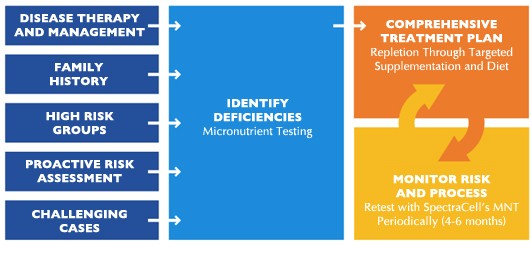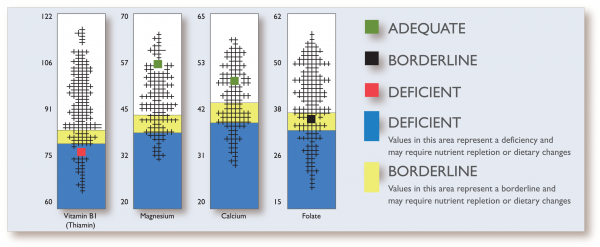SpectraCell’s Micronutrient test provides the most comprehensive nutritional analysis available by measuring functional deficiencies at the cellular level. It is an assessment of how well the body utilizes 33 vitamins, minerals, amino/fatty acids, antioxidants, and metabolites, while conveying the body’s need for these micronutrients that enable the body to produce enzymes, hormones, and other substances essential for proper growth, development, and good health. This test provides the basis of a personalized, functional approach in addressing a broad variety of clinical conditions including arthritis, cancer, cardiovascular risk, diabetes, various immunological disorders, metabolic disorders and micronutrient deficiencies.
Clinical Applications – How will this help my patients?
Identifying the right patient is simple. Our diagnostic profiles offer a window to the cell that can provide improved healthcare for all patients. However, the potential for clinical benefit is particularly evident in these patient groups:

DISEASE THERAPY AND MANAGEMENT: Diagnose and treat nutritional risk factors that contribute to the therapy/management of many degenerative disease conditions.
FAMILY HISTORY: Provide prevention measures for patients with family history of common chronic disease conditions.
HIGH RISK GROUPS: Certain high risk groups are more susceptible to vitamin, mineral and antioxidant deficiencies that can affect treatment outcomes and overall health.
PROACTIVE RISK ASSESSMENT: Provide customized prevention by early detection of nutritional deficiencies for proactive patients.
CHALLENGING CASES: Gain insight into generalized complaints with no apparent specific disease source and to provide treatment options based on biochemical individuality.
SpectraCell’s Micronutrient test includes:
Vitamins
|
Minerals
Amino Acids
Fatty Acids
|
Antioxidants
Carbohydrate Metabolism
|
Metabolites
SPECTROX™for Total Antioxidant Function IMMUNIDEX™Immune Response Score |
SpectraCell’s Tests Are More Advanced Than Other Laboratory Tests
Before the introduction of our tests, many diagnostic and risk assessments were based on clinical observation and measurements of static levels of certain nutrients in serum. Static serum levels are not always representative indicators for assessing cell metabolism and utilization.
SpectraCell’s micronutrient testing offers a unique means to scientifically assess the intracellular requirements of micronutrients that play an important role in overall health and wellness of your patients. Our tests measure the biochemical function of vitamins, minerals, amino acids and antioxidants, providing a powerful clinical assessment tool for your practice.
Our panels are designed to provide you with the most comprehensive nutritional analysis available. As the only lab that can offer a truly functional intracellular testing, SpectraCell also provides you with targeted nutrient repletion recommendations for the deficiencies identified.
SpectraCell’s Patented Technology
SpectraCell’s patented, chemically-defined control media contains the minimal amount of each essential micronutrient that is needed to support optimal lymphocyte growth or mitogenic response. The functional intracellular status of micronutrients involved in cell metabolism is evaluated by manipulation of the individual micronutrients in the media followed by mitogenic stimulation and measurement of DNA synthesis.
The same technology also provides a total antioxidant function test (SPECTROX™) which assesses the ability of cells to resist damage caused by free radicals and other forms of oxidative stress. Due to the considerable number of cellular antioxidants with extensive interactions, redundancies, repair and recharging capabilities, measuring total function is the most accurate and clinically useful way to assess your patients’ capacity to resist oxidative damage.
Since lymphocytes are produced in the bone marrow and stored in the peripheral locations for long periods of time (the average life span of a lymphocyte is approximately four to six months), SpectraCell’s measurements provide a powerful portrait of each patients’ long-term nutrient status. This is analogous to the use of a glycosylated hemoglobin test to evaluate blood glucose levels over a one to three month period.
Interpreting Test Results
SpectraCell provides easy-to-read test reports for the clinician and the patient. We’ve incorporated numerical and graphic representations for each result, and we offer repletion suggestions based on each patient’s deficiencies. We’ve included easy-to-understand supplement information that explains the role of each nutrient found deficient, deficiency symptoms, how to obtain that nutrient in food and toxicity and RDI standards for adults.

IMMUNIDEX™ Immune Response Score – A unique Clinical Tool
A patient’s IMMUNIDEX™ score is one measurement to evaluate a person’s cell-mediated immune system performance. Specifically, it measures T-cell lymphocyte proliferation. Since immune function is a systemic measure of general health, a higher IMMUNIDEX™ score is generally desired since it means a person can respond efficiently not only to exogenous threats such as pathogens or allergens, but also to endogenous threats like tumors. The immune system, comprised of both cell-mediated (Th1) and humoral (Th2) components, when balanced and performing optimally, affords us critical protection and promotes health and wellness.
Micronutrient deficiencies will undermine a person’s immune function, and thus lower the IMMUNIDEX™. Since the highly complex immune system is dependent on the intracellular availability of vitamins, minerals and antioxidants, correcting specific micronutrient deficiencies typically raises the IMMUNIDEX™ and contributes to tangible clinical benefits, such as reduced infections and may assist in achieving Th1/Th2 balance.
There is no additional charge for this calculated test result. Ordering instructions are the same – same kit, same blood draw instructions.
General Information
Test Results:
Easy-to-read, comprehensive test results are returned within three weeks.
Each report provides a scientific analysis of your patients’ nutritional deficiencies.
Additional Resources:
Clinical Support: 800-227-5227
Web: www.spectracell.com
Confidentiality:
SpectraCell is dedicated to safeguarding patient privacy and the confidentiality of all patient information. For this reason, patient test results are only released to the ordering physician. Patient information is only utilized internally for company operational purposes and as required by law. Patient records, electronic and hard copy, will be maintained under a strict policy of confidentiality according to HIPAA guidelines.

